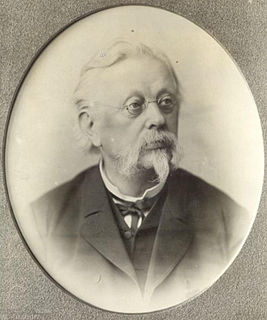
Johann Nikolaus Forkel was a German musician, musicologist and music theorist.

Wilhelm Friedemann Bach, the second child and eldest son of Johann Sebastian Bach and Maria Barbara Bach, was a German composer and performer. Despite his acknowledged genius as an organist, improviser and composer, his income and employment were unstable and he died in poverty.

Friedrich Wilhelm Zachow or Zachau was a German musician and composer of vocal and keyboard music.

Johann Adam Hiller was a German composer, conductor and writer on music, regarded as the creator of the Singspiel, an early form of German opera. In many of these operas he collaborated with the poet Christian Felix Weiße.

Johann Wilhelm Schirmer was a German landscape artist from Jülich, within the Prussian Duchy of Jülich.

Christian Gottfried Körner was a German jurist. His home was a literary and musical salon, and he was a friend of Friedrich Schiller.

The Thomanerchor is a boys' choir in Leipzig, Germany. The choir was founded in 1212. At present, the choir consists of about 90 boys from 9 to 18 years of age. The members, called Thomaner, live in a boarding school, the Thomasalumnat, and attend the Thomasschule zu Leipzig, a Gymnasium school with a linguistic profile and a focus on musical education. The younger members attend the primary school 76. Grundschule in der Manetstraße. Johann Sebastian Bach served as Thomaskantor, director of the choir and church music in Leipzig, from 1723 to 1750.

Wilhelm Rust was a German musicologist and composer. He is most noted today for his substantial contributions to the Bach Gesellschaft edition of the works of Johann Sebastian Bach.

Albrecht, Duke of Saxe-Eisenach, was a ruler of the duchy of Saxe-Eisenach. He was the seventh son of Johann, Duke of Saxe-Weimar, and Dorothea Maria of Anhalt. His regnal name Albert IV derives from the numbering of the duchy of Saxony as a whole, not specifically to the succession in Saxe-Eisenach.

Ernst Friedrich Karl Rudorff was a German composer and music teacher, also a founder of nature protection movement.

Johann Christian Kittel was a German organist, composer, and teacher. He was one of the last students of Johann Sebastian Bach. His students included Michael Gotthard Fischer, Karl Gottlieb Umbreit, Johann Wilhelm Hässler and Christian Heinrich Rinck. See: List of music students by teacher: K to M#Johann Christian Kittel.
St. Thomas School, Leipzig is a co-educational and public boarding school in Leipzig, Saxony, Germany. It was founded by the Augustinians in 1212 and is one of the oldest schools in the world.
Ernst Wilhelm Wolf was a German composer.
Karl Ferdinand Becker, was a German writer on music, and an organist.
The Tischbein family was a German family of artists, originating in Hesse and spanning three generations. The family patriarch, Johann Heinrich Tischbein (1682-1764), was a master baker at the State Hospital in Haina. The Tischbeins also produced a number of master carpenters..
Gustav Hartenstein was a German philosopher and author. He was one of the most gifted followers of Johann Friedrich Herbart.
The Johann Sebastian Bach Institute was an institute dedicated to Johann Sebastian Bach in Göttingen, Germany. It was founded in 1951 as one of two institutes preparing the New Bach Edition, the second complete edition of the composer's works. The partner organisation was the Leipzig Bach Archive in what was then East Germany on the other side of the Iron Curtain from Göttingen. The new edition met rigorous scientific requirements and at the same time served musical practice.
Gottfried Wilhelm Sacer was a German jurist, poet, satirist and Protestant hymn writer. He worked as an advocate at the court of Wolfenbüttel. Johann Sebastian Bach used a stanza from his hymn "Gott fähret auf gen Himmel" to conclude his Ascension Oratorio.
Eduard Mertke was a Baltic German composer.













